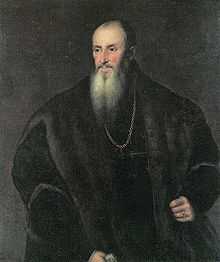Nicolas Perrenot de Granvelle

Nicolas Perrenot de Granvelle (1486–1550) was a Burgundian politician who served as a closed trusted advisor to Emperor Charles V. He was made suzerain of the imperial city of Besançon and held an influential position in the Netherlands. From 1530 until his death he was one of the emperor's most trusted advisers in Germany. He was the father of the cardinal and politician Antoine Perrenot de Granvelle, also a leading Habsburg minister, and built the Palace Granvelle in Besançon.
Life
In 1518 he became a lawyer and was called at the age of 34 years to the Parliament of the Free County of Burgundy.
In 1519 Charles the Fifth was elected emperor at the age of 19 years. Nicolas Perrenot de Granvelle quickly became his very close man of trust. He became a chancellor of the empire. His sons and son-in-laws (Granvelle family) were going to occupy the best places of the county and in the imperial courtyard.
In 1527 he bought the seigniory of Grandvelle, located in the Bailiwick of Amont (Bailliage d'Amont), administrative territory located in present-day Haute-Saône department, which later became better known under the name of Granvelle. In 1530, after the death of Mercurino Gattinara, he became one of the emperor's most trusted advisers in the Holy Roman Empire, and played that role until to his death.
He died on August 27, 1550, at the age of 64 years, while attending the Imperial Diet in Augsburg. He owned a significant art collection and library, the later now in the Bibliothèque municipale de Besançon.[1]
Succession
Of Granvelle's five sons three played a political role. He prepared his elder son Antoine Perrenot de Granvelle for his position as a diplomat, and state adviser of the emperor Charles the Fifth. Antoine became archbishop of the Archdiocese of Mechelen-Brussels, then the cardinal of Granvelle. He tried to help for a career of his younger sons.
In two generations, the family existent Perrenot de Granvelle of a modest rural middle Comtois became the most powerful and the richest in the region. The Granvelle de Besançon palace in Franche-Comté is the symbol of their wonderful success and social ascent.
References
- ↑ Les Granvelle et les anciens Pays-Bas: liber doctori Mauricio van Durme (Leuven University Press, 2000), p. 19
Further reading
- Wilhelm Maurenbrecher: Granvelle, Nicolaus Perrenot von. In: Allgemeine Deutsche Biographie (ADB). Band 9. Duncker & Humblot, Leipzig 1879, pp. 580–584
|